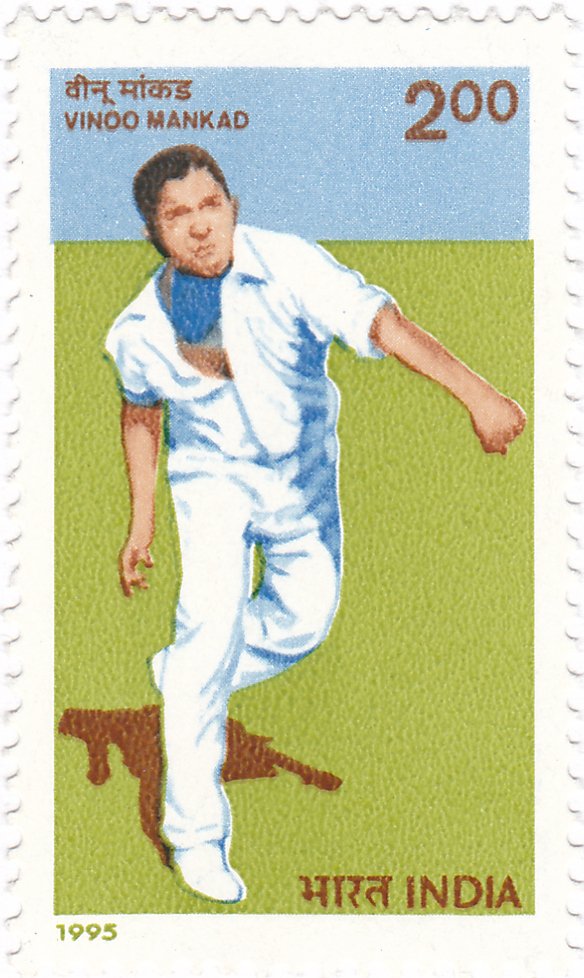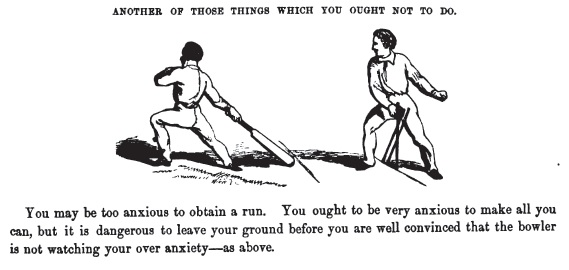On this day, 1948, during the Sydney Test, Vinoo Mankad whipped off the bails at the non-striker& #39;s end.
Bill Brown, out of the crease, was ruled out.
The mode of dismissal is unofficially referred to as Mankading.
There are a few misconceptions regarding Mankading.
+
Bill Brown, out of the crease, was ruled out.
The mode of dismissal is unofficially referred to as Mankading.
There are a few misconceptions regarding Mankading.
+
Misconception 1: Mankad was the first to do this
Mankad was the first to do this *in a Test match*. However, there was nothing new about it.
The first recorded instance of Mankading in First-Class cricket happened in 1835 (not 1935).
Thomas Barker ran out George Baigent.
+
Mankad was the first to do this *in a Test match*. However, there was nothing new about it.
The first recorded instance of Mankading in First-Class cricket happened in 1835 (not 1935).
Thomas Barker ran out George Baigent.
+
By 1843, Barker had run out four others, the last of these at Lord& #39;s.
No "spirit of cricket" garbage was uttered during any of this.
This illustration is from Nicholas Felix& #39;s 1845 book Felix on the Bat.
Do not miss the caption. This was the general attitude towards this.
+
No "spirit of cricket" garbage was uttered during any of this.
This illustration is from Nicholas Felix& #39;s 1845 book Felix on the Bat.
Do not miss the caption. This was the general attitude towards this.
+
Lord Harris of Eton Mankaded Conrad Wallroth of Harrow at Lord& #39;s in 1870.
No MCC member is known to have mumbled any "gentleman& #39;s game" nonsense.
Spencer Gore, the first man to win the Wimbledon, was present that day.
Let me quote him from a book on the history of Harrow:
+
No MCC member is known to have mumbled any "gentleman& #39;s game" nonsense.
Spencer Gore, the first man to win the Wimbledon, was present that day.
Let me quote him from a book on the history of Harrow:
+
"Harris … noticed that Wallroth, who was well set, was backing up too eagerly. He put himself on to bowl (quite rightly, to my mind), and, pretending to bowl, caught Wallroth tripping, and he paid the penalty."
There is no mention of a warning.
Or "spirit of cricket".
+
There is no mention of a warning.
Or "spirit of cricket".
+
This used to be the standard response.
By the way, Mankad was not even the first Indian to do this.
Ram Singh ran out Narayan Sane in a Ranji Trophy match of 1941-42.
Misconception 2: Mankad never warned Brown
+
By the way, Mankad was not even the first Indian to do this.
Ram Singh ran out Narayan Sane in a Ranji Trophy match of 1941-42.
Misconception 2: Mankad never warned Brown
+
Brown had made the same error during one of India& #39;s tour matches at Sydney.
Mankad warned Brown once. When Brown did it again, he ran him out.
Three days later Brown did the same at Brisbane.
Mankad warned him. Brown got away.
+
Mankad warned Brown once. When Brown did it again, he ran him out.
Three days later Brown did the same at Brisbane.
Mankad warned him. Brown got away.
+
You cannot blame Mankad for not warning in the Test match.
Brown threw the bat on the pitch in anguish – but had little option but to swallow his pride and return to the pavilion.
Misconception 3: Mankad was criticised heavily
Let me list a few quotes.
+
Brown threw the bat on the pitch in anguish – but had little option but to swallow his pride and return to the pavilion.
Misconception 3: Mankad was criticised heavily
Let me list a few quotes.
+
Bill O& #39;Reilly (after the tour match): "There is nothing in the laws of the game to say that the bowler shall even warn the batsman of his unfair play. Mankad subscribed to the ethical rule … Brown was at fault."
On a lighter note, O& #39;Reilly would later utter a classic on air:
+
On a lighter note, O& #39;Reilly would later utter a classic on air:
+
"It would never happen when I was bowling because the batsman at my end was never anxious to get down to the other end."
Ray Robinson& #39;s piece in The Sun (Sydney) had the headline "Brown learns the hard way; run out again".
Don Bradman in A Farewell to Cricket:
+
Ray Robinson& #39;s piece in The Sun (Sydney) had the headline "Brown learns the hard way; run out again".
Don Bradman in A Farewell to Cricket:
+
"Mankad was scrupulously fair that he first of all warned Brown before taking any action. There was absolutely no feeling in the matter as far as we were concerned, for we considered it quite a legitimate part of the game."
Bradman led Australia in the Test.
+
Bradman led Australia in the Test.
+
The Sydney Morning Herald asked for the readers& #39; opinions.
They generally voiced the same opinion.
A reader called AW Richards wrote: "If Brown does not know the rules or will not accept decisions in a sporting manner, he is not a proper person to play for Australia.
They generally voiced the same opinion.
A reader called AW Richards wrote: "If Brown does not know the rules or will not accept decisions in a sporting manner, he is not a proper person to play for Australia.
"Let them ask any schoolboy, and they will be told & #39;stay in your crease until the ball has been delivered& #39;."
There was another letter from a reader with initials IWM.
It is better to post the entire clipping instead of typing it out.
+
There was another letter from a reader with initials IWM.
It is better to post the entire clipping instead of typing it out.
+
Interestingly, another reader (LJ Pearson) recommended calling it one short.
There were exceptions.
Duleepsinhji, in The Telegraph, was an exception: "Although by the laws of cricket this was justified it leaves a bad taste. I hope I do not see another similar incident."
+
There were exceptions.
Duleepsinhji, in The Telegraph, was an exception: "Although by the laws of cricket this was justified it leaves a bad taste. I hope I do not see another similar incident."
+
Jack Fingleton, who usually opposed everything Bradman said or did, expectedly did not approve of the dismissal.
But the general voice – of Australian cricketers, critics, and fans – was in favour of Mankad.
Because he did the right thing and Brown did not.
But the general voice – of Australian cricketers, critics, and fans – was in favour of Mankad.
Because he did the right thing and Brown did not.
Edit:
>> Ram Singh ran out Narayan Sane in a Ranji Trophy match of 1941-42
The other way round. Sane ran out Ram Singh.
>> Ram Singh ran out Narayan Sane in a Ranji Trophy match of 1941-42
The other way round. Sane ran out Ram Singh.
All this obviously happened on this day, *1947
Not 1948
Not 1948

 Read on Twitter
Read on Twitter




